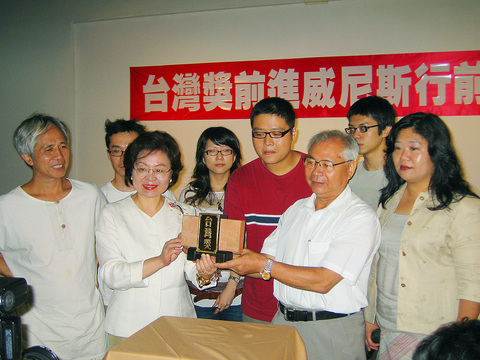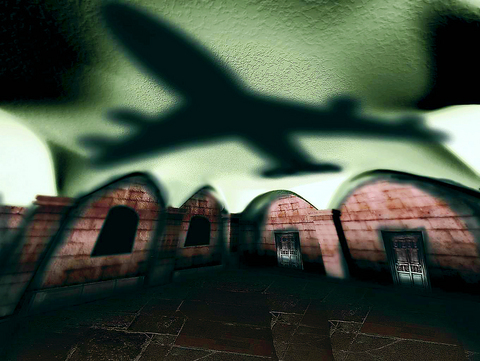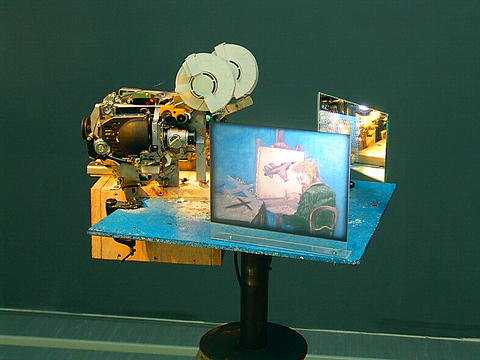Taiwan's contributions to the Venice Biennale have gained recognition from the international art community, but this year four graduate students from Taipei National University of the Arts (TNUA) have decided to turn things around with a fresh idea and US$20,000.
The students are members of the Hedao Group (
Hedao's projects are designed to create the maximum impact: Instead of manipulating physical objects to create art, they seeks to manipulate the institutions that evaluate art.

PHOTO: MEREDITH DODGE, TAIPEI TIMES
They do this by raising money for cash awards to be given at major art exhibitions. This year the "Taiwan Award" of US$20,000 will be handed over to the winner of their choice at the Venice Biennale on June 11.
The Hedao Group intends to subvert the process of cultural colonization and globalization by creating the award. It reasons that Taiwan is a small country that struggles to be recognized in the world of contemporary art, where discourse is dominated by a Western point of view.
What the Hedao Group intends to take to Venice is not a work of art to be judged, but rather a unique Taiwanese viewpoint with which to judge other works of art.

PHOTOS COUTESY OF TFAM
The Hedao Group flier states that "the Taiwan Award seeks to reverse the subject-object relationship, adopting the role of observer and a specifically Taiwanese viewpoint to assess the Venice Biennale."
The Hedao Group raised the cash for the Taiwan Award by going around the country
fundraising. Most of the donations were from individuals and non-profit organizations, rather than large corporations or public agencies.

"There were book clubs that donated, [even] housewives that found ways to save an extra NT$1,000 per month" said group member Lu Hao-yuan (
Besides monetary contributions, the Hedao Group has gained support of another kind. In order to ensure that the Taiwan Award accurately represents Taiwan's viewpoint, the group's members asked accomplished Taiwanese cultural figures from a variety of disciplines to serve as judges for the award.
The panel they assembled includes filmmaker Tsai Ming-liang (

The Hedao Group created a stir with their first "meta" art project, An Award for Taipei Biennale. It hopes to continue subverting the politics and structure of arts exhibitions and awards by taking the Taiwan Award to New York's Whitney Biennial and Germany's Kassel Documental X.
The group, plus the judges and accompanying art critics, will head for Venice this Saturday. Deliberations will begin next Thursday and the award will be presented at the Hotel Monaco and Grand Canal, on June 11.
The trophy for the award, designed by Zhuang Wu-nan (

Towering high above Taiwan’s capital city at 508 meters, Taipei 101 dominates the skyline. The earthquake-proof skyscraper of steel and glass has captured the imagination of professional rock climber Alex Honnold for more than a decade. Tomorrow morning, he will climb it in his signature free solo style — without ropes or protective equipment. And Netflix will broadcast it — live. The event’s announcement has drawn both excitement and trepidation, as well as some concerns over the ethical implications of attempting such a high-risk endeavor on live broadcast. Many have questioned Honnold’s desire to continues his free-solo climbs now that he’s a

Lines between cop and criminal get murky in Joe Carnahan’s The Rip, a crime thriller set across one foggy Miami night, starring Matt Damon and Ben Affleck. Damon and Affleck, of course, are so closely associated with Boston — most recently they produced the 2024 heist movie The Instigators there — that a detour to South Florida puts them, a little awkwardly, in an entirely different movie landscape. This is Miami Vice territory or Elmore Leonard Land, not Southie or The Town. In The Rip, they play Miami narcotics officers who come upon a cartel stash house that Lt. Dane Dumars (Damon)

Francis William White, an Englishman who late in the 1860s served as Commissioner of the Imperial Customs Service in Tainan, published the tale of a jaunt he took one winter in 1868: A visit to the interior of south Formosa (1870). White’s journey took him into the mountains, where he mused on the difficult terrain and the ease with which his little group could be ambushed in the crags and dense vegetation. At one point he stays at the house of a local near a stream on the border of indigenous territory: “Their matchlocks, which were kept in excellent order,

Today Taiwanese accept as legitimate government control of many aspects of land use. That legitimacy hides in plain sight the way the system of authoritarian land grabs that favored big firms in the developmentalist era has given way to a government land grab system that favors big developers in the modern democratic era. Articles 142 and 143 of the Republic of China (ROC) Constitution form the basis of that control. They incorporate the thinking of Sun Yat-sen (孫逸仙) in considering the problems of land in China. Article 143 states: “All land within the territory of the Republic of China shall